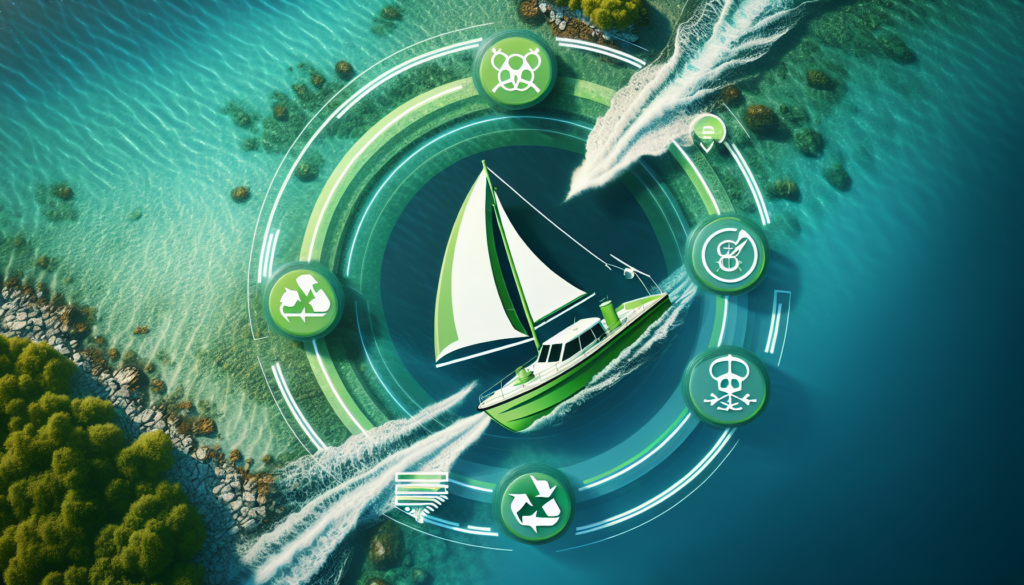Sailing the open seas has never looked better as more and more boating enthusiasts are embracing environmentally friendly practices. This shift is majorly influenced by the Eco-Friendly Boating Regulations which determine how you can make your boating more sustainable while remaining compliant. The rules might seem pretty daunting at first glance. However, they’re essential for preserving our beautiful oceans and promoting safer boating practices. This article unveils how you can play your part in this heroic effort to protect our seas, discussing the intricacies of regulations, offering advice on compliance, and bringing to light how enforcement works.

Understanding Eco-Friendly Boating Regulations
Boating, as much fun and leisurely as it can be, for you, poses a significant impact on the environment. The good news is, eco-friendly boating regulations are here to help. Let’s delve into why they’re important.
Significance of eco-friendly regulations
You may wonder, why should you care about eco-friendly boating regulations? Well, it’s simple. Boats cause pollution – whether it’s through fuel emissions, oil leaks, or sometimes, the illegal dumping of waste. Eco-friendly regulations aim to lessen this damage to our waters and wildlife, making sure your hobby doesn’t harm the environment.
Basics of eco-friendly boating regulations
Eco-friendly regulations aren’t all about punishment. They’re guidelines aimed towards promoting sustainable boating practices. This generally includes methods of proper waste management, avoiding spillage of oil or fuel, and other steps to reduce your boat’s carbon footprint.
Current international standards for eco-friendly boating
Today, there are international standards in place promoting eco-friendly boating, like the International Convention for the Prevention of Pollution from Ships, and guidelines set by the International Maritime Organization. These emphasize things like minimizing operational pollution and ensuring the right equipment for safe and clean fuel handling.
Eco-Friendly Boating Materials and Technologies
Stepping into the world of eco-friendly boating can be made easier by understanding technologies and materials available at your disposal.
Green boating technologies
On the technological front, green boating innovations range from electric propulsion systems to solar panels and wind turbines. Noise-free and smoke-free electric motors, for instance, cut down on fuel emissions drastically.
Recommended materials for eco-friendly boats
When it comes to materials, things like eco-friendly anti-fouling paints and biodegradable cleaning products do a world of good. Additionally, choosing boats made from recyclable or sustainable materials can greatly reduce the environmental footprint of your boating activities.
Innovations in eco-friendly boating equipment
The advancement in technology has led to the development of a myriad of eco-friendly boating equipment. Working in harmony with the environment, there are innovations like photovoltaic panels for cleaner energy sources, dissolved oxygen sensors for monitoring water quality, and many more.
Maintenance and Operations for Eco-Friendly Boating
You’ve got your boat and you’re ready to sail! But remember, maintenance and operations are key in keeping your boat eco-friendly.
Sustainable boat cleaning
cleaning your boat sustainably is one of the easiest ways to be an eco-friendly boater. Avoid harsh chemicals and instead opt for biodegradable products that won’t harm marine life. Even something as simple as cleaning your boat on land can prevent pollutants from entering the water.
Environmental impact of maintenance practices
The manner in which you maintain your boat can significantly impact the environment. Practices such as responsibly disposing of your boat’s waste and taking care when refueling can dramatically reduce your environmental impact.
Guidelines for eco-friendly boat operation
There’s also the operation of the boat to keep in mind. Operate at a steady pace to save fuel, consider equipment that reduces engine pollution, and consider the wildlife around you. Quick shifts in direction and speed, for example, could harm marine life.

Compliance with Eco-Friendly Boating Regulations
Now that your boat is in tip-top eco-friendly shape, it’s time to familiarize yourself with the compliance requirements.
Basic compliance requirements
Basic compliance with green boating regulations means more than just following the posted speed limit. This could include installing appropriate disposal systems, reducing engine emissions and ensuring sustainable boating practices.
Processes for demonstrating compliance
To demonstrate compliance, many regulations require routine checks or certifications, such as possessing an Oil Discharge Monitoring Equipment for oil tankers or keeping a garbage record book.
Role of boat inspections in compliance
Boat inspections play an essential role in ensuring compliance with eco-friendly regulations. Regular inspections can help identify potential issues early, preventing possible environmental damage and legal consequences.
Enforcement of Eco-Friendly Boating Regulations
Regulations only make a difference if they are enforced. So, it’s equally important to familiarize yourself with the possible enforcement measures.
Types of enforcement measures
Enforcement can involve anything from inspections and audits, to grading schemes and compliance certifications. Failure to comply might result in various penalties.
Penalties for non-compliance
Penalties for non-compliance can be hefty, including fines, imprisonment, and even suspension or revocation of the boater’s license.
Role of enforcement in promoting eco-friendly boating
Through enforcement, eco-friendly boating is further promoted. It serves as a deterrent for those who might otherwise disregard the impact of their actions on the environment.
Role of Government in Eco-Friendly Boating
Your local and national government play a crucial role in setting regulations and promoting eco-friendly boating.
Government regulations for eco-friendly boating
Government bodies set regulations to control the environmental footprint of boating. These cover a wide range of subjects, from waste disposal and emission controls to more specific conservation rules in protected areas.
Government incentives for sustainable boating
Many times, governments offer incentives to promote green boating. This could include discounts on marina fees for boats with environmentally-friendly equipment or financial support for switching to more eco-friendly technologies or fuels.
Public initiatives promoting eco-friendly boating
Public initiatives, organized by governments or other organizations, are also a common way to encourage boaters to adopt eco-friendly practices. This could entail public talks, informational booths at maritime festivals, or even organized cleaning activities.
Impact of Non-compliance on Environment
Non-compliance with eco-friendly rules can take a heavy toll on our environment and marine life.
Environmental effects of non-compliant boating practices
Non-compliant practices can lead to pollution and damage to aquatic ecosystems. Its effects include water contamination, loss of biodiversity, and the disruption of the food chain.
Impact on marine life
Direct discharge of pollutants into the water can severely harm marine life. It can result in a large number of fatalities among aquatic animals and plants and impact organisms up the food chain.
Potential for long-term damage
Non-compliance can also lead to longer-term damage such as the bleaching of coral reefs and the destruction of habitats. It sadly ends up leading to a decrease in the diversity and abundance of marine life over time.
Educating Boaters on Eco-Friendly Practices
Knowledge is power, and educating boaters on the importance of eco-friendly practices is crucial.
Effective education strategies
Effective education strategies might involve workshops, online courses, and other interactive means that encourage learning and retention.
Role of boating schools in fostering environmental awareness
Boating schools play an essential role in fostering environmental awareness. Through targeted training, they can mold minds to prioritize eco-friendly habits from the very start.
Community outreach to promote sustainable boating
Community outreach via various activities and awareness drives can also serve to disseminate knowledge of sustainable boating.
Case Studies on Successful Eco-Friendly Boating
Learning from past successes can help steer the future of eco-friendly boating.
Examples of successful implementation of eco-friendly boating regulations
Case studies are an effective way of measuring the success of eco-friendly initiatives. They offer insights into measures that have been particularly successful in promoting green boating.
Strategies used by eco-friendly boating champions
Eco-friendly boating champions, often recognized through awards and recognitions, serve as examples of best practices, and their strategies can provide a roadmap for others.
Lessons learned from successful case studies
Analyzing case studies can yield lessons on what worked and what didn’t, helping to refine regulations and practices to make them more effective.
The Future of Eco-Friendly Boating
As technology and awareness advance, the future of eco-friendly boating looks bright.
Potential improvements in eco-friendly boating regulations
As our understanding of the environment and technology grows, regulations surrounding eco-friendly boating are expected to evolve to be even more effective.
Emerging technologies for sustainable boating
With the pace of technological advancement, the possibilities for sustainable boating are immense. From water purifiers powered by solar energy to biofuels and self-cleaning hull technologies, the future is, indeed, green.
Predicted trends in compliance and enforcement
With increasing public awareness and governmental supervision, compliance and enforcement trends are leaning towards stricter measures, promising a cleaner and safer sea.
Eco-friendly boating encapsulates many aspects, but the core principle remains the same – respect for our waters. So, as you enjoy your boating activities, remember: you have the power to make a difference. Navigate your boat, and your actions, towards an eco-friendlier future.

